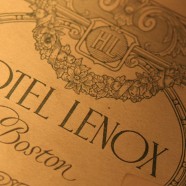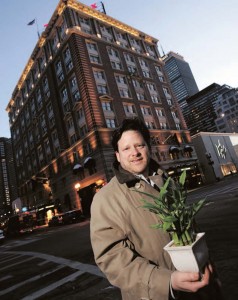
Tedd Saunders ’79 doesn’t like to say that he pioneered the green hotel movement. A third-generation hotelier, in 1989 he sold his family on the idea that they could reduce their environmental footprint, offer four-star service, and still make a profit. He wrote a book about how to do it and launched a consulting firm to spread his eco-friendly business ideas.
Tedd’s hotels were the first in the United States to offer guests, among other things, the option of reusing towels and sheets for more than one night. He was ahead of his time when he came up with the idea of luxury, urban ecotourism in the late 1980s. The notion didn’t strike him in a steamy jungle—the place most people associate with ecotourism. He was in the maze-like basement of the 900-plus-room, million-square-foot Park Plaza Hotel watching huge pallets of products arriving and baled rubbish on the way to the trash.
 “I remember thinking that there had to be a better way to run a hotel than creating all this waste and consuming all this material,” he says. “Could we run our hotels in a responsible way that wouldn’t diminish the comfort and luxury of the guest experience?”
“I remember thinking that there had to be a better way to run a hotel than creating all this waste and consuming all this material,” he says. “Could we run our hotels in a responsible way that wouldn’t diminish the comfort and luxury of the guest experience?”
Turns out that the Saunders Hotel Group could. Over the past 23 years, Tedd has earned a name for himself spearheading urban ecotourism. He launched the effort by measures such as finding a driver with a tractor-trailer willing to haul the Park Plaza’s 1,500 phone books to the city’s only recycling center. Today, he can count more than 100 separate, non-toxic, energy-
saving initiatives at the company’s six hotels, including a new electric-car charging station—the first curbside one in Boston—at the 113-year-old Lenox Hotel in Back Bay.
The notion of a responsible company was a good fit, he explained, for a family business that cares about its legacy “not just for the next generation, but for the entire community.”
Still, when he was preparing to pitch the idea to his father, brothers, and the rest of the company’s executive board, he couldn’t find a model to point to of what is now known as “sustainable tourism.”
“The initiative was a giant leap of faith for my family,” Tedd says. “None of us knew how big it would become.”
During a tour of the Lenox, Tedd glances at a well-worn, highlighted checklist. Moving from the elegant lobby, onto the elevator and into one of the spacious eleventh floor rooms, he mentions some of the amenities: superefficient heating and cooling systems; eco-friendly Herman Miller chairs; sustainably harvested paper products; reusable bottles with filtered water; and infrared motion-sensor thermostats. When the hotel couldn’t find energy-saving candelabra light bulbs for the hotel’s antique fixtures, they had them made.
“It’s very systemic,” he says. “We don’t just say, ‘Let’s do these three things.’ We’re always asking, ‘What are the next big impact things we can do?’”
That thinking led to “Heaven on 11.” While some other hotels offer allergen-free rooms, the Lenox offers an entire floor (and health club). Stepping into room 1108, Tedd describes how these rooms go a few steps further. After an ozone treatment that eliminates all traces of bacteria, mattress and pillows are fitted with dust-mite barriers. The air-conditioning system has an anti-microbial tea tree oil cartridge installed. The cleaning supplies are toxin-free, and the HEPA air purifier ensures the cleanest of air.
At the same time, the Lenox bills itself as “the original boutique hotel.” The LED sign on the roof is a Back Bay landmark. Famous guests include Anne Hathaway, Duke Ellington and Judy Garland, who stayed for three months. Visitors are promised “elegant design, seamlessly intuitive service and personalized comfort,” and judging from their top Trip Advisor ratings, the hotel delivers that.
Low key, with a trim beard, Tedd often skips the tie with his suit. At 51, he’s known as one of the progressives in his politically diverse family, but he is no hippie. He describes himself as of the “post–Woodstock, Kennedy, Martin Luther King generation that is committed to social justice and equality.” After a stint as an advertising executive, he set out to shoot stock photography in Asia with a camera and a backpack. As a member of a hotel family, he would have been welcomed at the region’s top resorts. Instead, he often stayed in simple hostels and camped amid stunning settings. That’s not too surprising, since his family—father, Roger, and three brothers, including his twin, Todd ’79—often went camping on summer vacations.
“I have wonderful memories of us being together in the outdoors,” he says. “Those were life-changing experiences.”
His parents were important influences. His father, who is 83 and still plays tennis twice a week, helped foster Tedd’s appreciation for life’s blessings, his ceaseless curiosity, and a way of life: “doing well by doing good.” Tedd’s mother, Nina, who died in 1991, was a childhood Holocaust survivor from Poland who taught him to be resourceful and pay attention to the details. In a way, she also helped him meet his wife. One Mother’s Day, after visiting a tree planted in the Public Garden in his mother’s honor (she was on the park’s board), Tedd took a stroll with his dog. He stopped to chat with a woman and her mother, who, like Tedd, were walking a Tibetan terrier. It was love at first sight. Two and a half years later that woman, Ella, became his wife. In 2012 they welcomed twins, Noah and Nina (named after Tedd’s mother and Ella’s grandmother). His Facebook page offers smiling pictures of them all. When a waitress at the hotel’s Boylston Street Irish pub asks him how he’s doing, before taking an order for tea, he says, “Wonderfully.”
The Saunderses live in Back Bay, not far from the family’s flagship Lenox. While he has an easy commute, Tedd has pulled back a bit from the business so that he has more time for the twins. He spends his mornings at home with Ella and the babies. Another step in that plan: limiting his travel. Tedd’s quest to transform the travel industry has kept him on the road for client presentations, speaking dates and meetings. He recently spoke at an industry roundtable on sustainability at Cornell’s hotel school.
“I was consumed day and night with maximizing the impact I was having on the world with my work,” he says. “I feel like I’m entering a different phase now, especially with our children here.”
He has had an impact: the hotels have a long list of national and international awards, as well as plenty of imitators around the globe.
“What we started back in the late ’80s is now an industry-wide phenomenon,” he says. “It is no longer a short-term trend. I go to the industry meetings, and all the big chains are there, proudly touting what they are doing.”
Not a leap of faith anymore—at least in terms of forward-thinking businesses across this industry and many others—“doing well by doing good has become smart business, a selling point and a money saver,” says Tedd. “The beauty is that we have the facts on our side.”
— Tinker Ready



